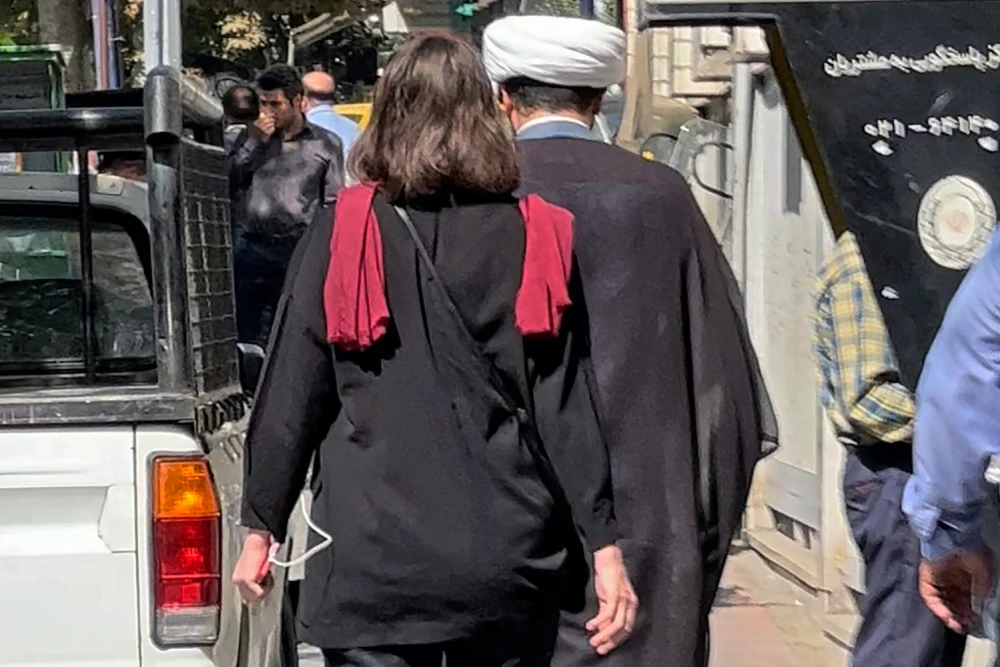Britain and the United States overthrew the country’s last democratic government. Supporting pro-democracy protesters is an opportunity for redemption.
A Chance to Be on Right Side of History in Iran
A specter is haunting London and Washington—the specter of the 1953 coup in Iran.
As diplomats on both sides of the Atlantic struggle to make sense of the national uprising that has erupted in Iran over the last four weeks, a debate is raging among them as to how Britain and the United States should respond to these protests.
Those doves who remain committed to negotiations for a nuclear deal with Tehran, despite the brutal suppression of peaceful protesters, argue that the United States and Britain should avoid meddling in Iran’s internal affairs, as they did in 1953.
At the opposite extreme, those hawks who have long advocated a policy of regime change in Iran elide the U.S. role in the 1953 coup or, more perversely, argue that Washington was right to intervene in 1953 and should do so again today.
For decades, it was history’s worst-kept secret that the 1953 coup was orchestrated by Britain’s Secret Intelligence Service and the CIA.
When the popular constitutional government of Prime Minister Mohammad Mosaddeq nationalized Iran’s British-owned oil industry in 1951, it set in train an Anglo-Iranian confrontation that ended with the toppling of Mosaddeq in a royalist coup in 1953.
The 1953 coup ended Iran’s parliamentary democracy and transformed the country’s young shah, Mohammad Reza Pahlavi, from a constitutional monarch to a dictator who would be overthrown in a revolution in 1979. The decision to intervene in Iran in 1953 was a disaster for Iranians and, in the long term, for both Britain and the United States.
But the misuse of the 1953 analogy is not only bad history—it is also bad policy. Britain and the United States were on the wrong side of history in 1953. Now they have an opportunity to be on the right side of history.
Mosaddeq was a liberal nationalist who wanted an independent and democratic Iran. When he visited the United States in 1951 to meet with President Harry Truman and present Iran’s case against Britain at the United Nations, he also toured the Liberty Bell and Independence Hall in Philadelphia and said Iranians envied Americans for having won their freedom from the English crown in 1776. President Dwight Eisenhower’s decision to back the 1953 coup was a profound betrayal of Mosaddeq and of Iran’s struggle for liberty.
There is a deep reluctance in London and Washington to do anything to draw attention to this inconvenient history. When the Green Movement erupted in Iran in 2009 over a fraudulent presidential contest that handed reelection to Mahmoud Ahmadinejad and denied victory to reformists, the Obama administration avoided supporting the Iranian protesters because it feared the Islamic Republic would invoke 1953 to brand the protesters as agents of the CIA. While Iranian protesters demanded that their votes be counted, President Barack Obama remained largely mute, issuing only a belated condemnation of the brutal suppression of the protests. Obama himself has acknowledged that this was an error of judgment.
Jake Sullivan, President Joe Biden’s national security advisor and a veteran of Obama’s Iran team, seems determined not to repeat this mistake and has been outspoken in his support for the Iranian demonstrators. Yet there are those in the State Department who invoke 1953 to argue for “noninterference” and press for a nuclear deal with the Islamic Republic. This would be a tragic mistake.
The explosion of protests across Iran in the last month, in cities large and small, is unprecedented. Women are in the vanguard of this national uprising, sparked by the death of 22-year-old Mahsa Amini at the hands of Iran’s so-called morality police for an alleged minor infraction of the Islamic Republic’s compulsory veiling laws. But Iranian women are not alone. Lawyers in Tehran, students in Rasht, shopkeepers in Mashhad, workers in Abadan—Iranians from all walks of life have joined their call for an end to the Islamic Republic.
For decades, Iranians gave the Islamic Republic opportunity after opportunity to peacefully reform itself. For decades, successive U.S. administrations, both Democrat and Republican, searched for an elusive Iranian moderate they could do business with. Twice Iranians elected moderate presidents—Mohammad Khatami and Hassan Rouhani—on promises of reform at home and détente with the West. Twice these moderates failed to deliver.
With the imposition of the hard-line conservative loyalist Ebrahim Raisi as president in a sham election in 2021, the hope of reform was extinguished, and the Islamic Republic has now reached a dead end. It is time to think the unthinkable and imagine a world without the Islamic Republic.
It would be a gross betrayal of Iranians if the United States, Britain, and the other signatories to the 2015 nuclear deal were to strike a deal with the Islamic Republic now and ease sanctions on a regime that has lost all legitimacy.
It would also be a betrayal of the democratic values that Britain and the United States claim to hold dear to help a regime that shoots protesting women in the streets and sends protesting schoolchildren to psychiatric institutions. The Islamic Republic has shown little enthusiasm for a nuclear deal, but its calculations may change as the situation grows more desperate inside Iran. The suspension of nuclear talks would send a clear message to Tehran that as long as the regime brutalizes protesters, it will not be business as usual in its dealings with Western powers.
A nuclear deal now with the Islamic Republic would render 2022 no less infamous than 1953 in history. Iranians are not asking for Anglo-American intervention in Iran, as happened nearly 70 years ago. Rather, this time, they are asking for Britain and the United States to stand on the side of the Iranian people as they fight to achieve the precious liberty that Mosaddeq dreamed of.









